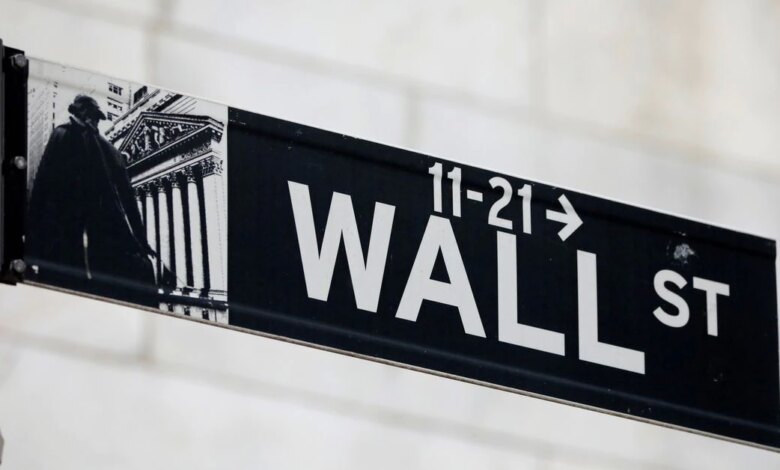Wall St Week Ahead Energy price spike adds market risk as earnings arrive

A road signal for Wall Avenue is seen outdoors of the New York Inventory Trade (NYSE) in New York Metropolis, New York, U.S., June 28, 2021. REUTERS/Andrew Kelly/File Picture
NEW YORK, Oct 8 (Reuters) – U.S. inventory market buyers are gauging whether or not extra volatility is forward due to surging world power costs, which may drive up inflation, erode revenue margins and stress shopper spending.
Shares rebounded this week after Monday’s losses left the S&P 500 down 5.2% from its document excessive hit in September. A truce within the U.S. Congress to keep away from a debt default supplied some aid, however buyers stay fearful about inflation, increased U.S. Treasury yields and the Federal Reserve’s plan to unwind its simple cash insurance policies.
Vitality prices are a significant factor for inflation, and can be a key matter as firms report third-quarter leads to coming weeks. Oil costs have surged greater than 25% since late August, with Brent topping $80 a barrel and hitting three-year highs. Pure gasoline costs in Europe have rocketed, inflicting alarm amongst political leaders.
Oil costs have a “roughly impartial” have an effect on on general company earnings, in response to Goldman Sachs strategists, with each 10% enhance in Brent costs boosting S&P 500 earnings per share by 0.3%.
Vitality shares have soared as crude costs climbed, but increased costs may weigh on firms starting from transportation to shopper discretionary corporations.
“We’re going to discover out if this piece of the inflation puzzle is the straw that breaks the camel’s again and truly begins slicing into margins,” stated Artwork Hogan, chief market strategist at Nationwide Securities. “There are incremental prices to the whole lot when power costs go up.”
Regardless of September’s pullback, the S&P 500 stays up about 17% up to now in 2021. At the same time as buyers swooped in to purchase the market’s newest dip, some Wall Avenue strategists are pointing to dangers that would include leaping into equities.
Analysts at Capital Economics stated in a word that rising power costs may put extra upward stress on bond yields. A bounce in yields roiled shares in latest weeks, significantly tech shares.
If oil costs preserve rising towards $100 a barrel, that “may proceed to weigh on sentiment,” stated Michael Arone, chief funding strategist at State Avenue International Advisors.
“If we break that barrier, I feel it is going to affect how persons are forecasting financial development and inflation and rates of interest, which has broad implications for sectors and industries and markets,” Arone stated.
As oil gained since late August, the S&P 500 power sector has elevated 25% towards a 1% drop for the general index. Vitality was the lone sector to submit constructive efficiency in September.
The power sector contains lower than 3% of the load of the S&P 500, nevertheless, and rising oil costs can increase gasoline and different prices for firms similar to transportation corporations, whereas additionally threatening demand by main customers to pay extra, similar to for gasoline on the pump.
JPMorgan strategists in a word this week outlined a basket of shares negatively impacted by oil at $100 a barrel, together with package deal supply firm FedEx , low cost retailer Greenback Tree and auto components retailer O’Reilly Automotive .
In a word final week, U.S. economists at Deutsche Financial institution stated the 101-cent enhance in gasoline costs from a 12 months earlier can be anticipated to result in a discount in revenue that may be spent on non-energy objects of about $120 billion.
Nonetheless, the relative quantity of shopper spending on gasoline and different power expenditures has trended decrease over the previous 40 years, in response to information from Jack Janasiewicz, portfolio supervisor at Natixis Funding Managers Options.
The % of non-public consumption expenditures dedicated to gasoline and different power spending has fallen from over 6% within the early Nineteen Eighties to 2.35% most just lately, Janasiewicz stated.
And JPMorgan strategists stated markets would have the ability to digest oil at $130 a barrel, because the economic system and shopper “have been functioning simply effective” over 2010-15, when oil averaged above $100.
“We don’t imagine that the present worth of power can have a major unfavorable affect on the economic system,” the strategists wrote.
Reporting by Lewis Krauskopf; Modifying by David Gregorio
:





